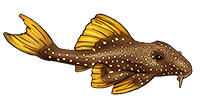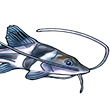Syno Ocellifer in pond?
Syno Ocellifer in pond?
Has anyone had experiance or think it would be possible to keep a few Syno Oceliffers in an outdoor koi type pond?
- racoll
- Posts: 5258
- Joined: 26 Jan 2004, 12:18
- My articles: 6
- My images: 182
- My catfish: 2
- My cats species list: 2 (i:2, k:0)
- My aquaria list: 1 (i:0)
- Spotted: 238
- Location 1: London
- Location 2: UK
Near Atlanta?
i don't know how cold it gets in the winter there.
if it is warm enough there, the problem is, that other natural ponds and water courses will be warm enough too.
if they get into the wild, by the activity of birds (eggs on feet or dropping a live specimen) they could have massive implications for wild fauna.
i don't recommend you do it.
i don't know how cold it gets in the winter there.
if it is warm enough there, the problem is, that other natural ponds and water courses will be warm enough too.
if they get into the wild, by the activity of birds (eggs on feet or dropping a live specimen) they could have massive implications for wild fauna.
i don't recommend you do it.
-
bronzefry
- Posts: 2198
- Joined: 31 Aug 2004, 16:01
- I've donated: $100.00!
- My articles: 6
- My images: 13
- My cats species list: 17 (i:0, k:0)
- My aquaria list: 7 (i:7)
- Spotted: 6
- Location 1: Sharon, Massachusetts, US
I'm very glad you asked this question!!!  It's a very important one. I know sometimes these ideas seem pretty good at the time. Please, please listen to Racoll on this one. I live in an area where "non-native species" have spread over the years. I encourage you to please go to the web site for the US Geological Survey in Gainesville, FL. They are tracking non-native species in the US and have a database.(I'm not sure about how to post a web site link.)
It's a very important one. I know sometimes these ideas seem pretty good at the time. Please, please listen to Racoll on this one. I live in an area where "non-native species" have spread over the years. I encourage you to please go to the web site for the US Geological Survey in Gainesville, FL. They are tracking non-native species in the US and have a database.(I'm not sure about how to post a web site link.)
-
Picklefish
- Posts: 52
- Joined: 19 Dec 2003, 18:32
- I've donated: $50.00!
- Location 1: SC, USA
- Interests: Africans and Cories
Are you saying not to keep non-native fish outdoors in ponds ?? I have, for the past few yearsn put many of my cichlids and Synos outdoors. I plan on giving some of my cories a summer in the sun this year. I use rubbermaid stock tanks from 100-300 gallons. I know of lots of individuals in my area that do this. Part of the problem in Fla stems from all the fishfarms I would think. No, I would never release anything into the wild and my dogs go a good job of keeping wild critters out of the yard.
- racoll
- Posts: 5258
- Joined: 26 Jan 2004, 12:18
- My articles: 6
- My images: 182
- My catfish: 2
- My cats species list: 2 (i:2, k:0)
- My aquaria list: 1 (i:0)
- Spotted: 238
- Location 1: London
- Location 2: UK
Yes, that's my opinion.
i'm sure in your situation it would seem improbable that any fish could escape, but the fact is that birds are key in transmitting fish species from place to place.
have you ever wondered how fish get into ponds in the middle of nowhere. birds.
this is one of the reasons why fish eggs are so sticky.
i'm sure in your situation it would seem improbable that any fish could escape, but the fact is that birds are key in transmitting fish species from place to place.
have you ever wondered how fish get into ponds in the middle of nowhere. birds.
this is one of the reasons why fish eggs are so sticky.
-
bronzefry
- Posts: 2198
- Joined: 31 Aug 2004, 16:01
- I've donated: $100.00!
- My articles: 6
- My images: 13
- My cats species list: 17 (i:0, k:0)
- My aquaria list: 7 (i:7)
- Spotted: 6
- Location 1: Sharon, Massachusetts, US
Picklefish,
If you go to any of the major internet/catalog sites that sell plants (Dr's Fosters&Smith or That Fish Place), there will be a "Restricted List" for plants. Many states have restricted the sales of certain aquaria plant species because they've adapted to cold water climates. A pond down the street from me, in Massachusetts, had become overwhelmed with Parrot's Feather(Milfoil). The water temperature listed in a book for this plant is 64-75 degrees F. But, the pond near my house never gets above 50 degrees F. Year after year, the Milfoil keeps coming back. Several ponds in Massachusetts have this problem. I don't know where to begin with the fish.
My sister lives in Cape Coral, FL. She has 60" long Iguanas in her backyard. They swim in the saltwater canals. It's not just fish farms.
If you go to any of the major internet/catalog sites that sell plants (Dr's Fosters&Smith or That Fish Place), there will be a "Restricted List" for plants. Many states have restricted the sales of certain aquaria plant species because they've adapted to cold water climates. A pond down the street from me, in Massachusetts, had become overwhelmed with Parrot's Feather(Milfoil). The water temperature listed in a book for this plant is 64-75 degrees F. But, the pond near my house never gets above 50 degrees F. Year after year, the Milfoil keeps coming back. Several ponds in Massachusetts have this problem. I don't know where to begin with the fish.
My sister lives in Cape Coral, FL. She has 60" long Iguanas in her backyard. They swim in the saltwater canals. It's not just fish farms.
- sidguppy
- Posts: 3827
- Joined: 18 Jan 2004, 12:26
- My articles: 1
- My images: 28
- My aquaria list: 5 (i:0)
- Spotted: 9
- Location 1: Southern Netherlands near Belgium
- Location 2: Noord Brabant, Netherlands
- Interests: African catfishes and oddballs, Madagascar cichlids; stoner doom and heavy rock; old school choppers and riding them, fantasy novels, travelling and diving in the tropics and all things nature.
- Contact:
Those Iguana's make excellent dinner; taste a bit like chicken, really.
apart from that, they're very nice to look at and completely harmless.
a bit of a "Jurassic Parc" garden!
wish it was that warm here; Iguana's in the garden.....
unfortunately when I look out; it's white now and too cold for me to venture out.
apart from that, they're very nice to look at and completely harmless.
a bit of a "Jurassic Parc" garden!
wish it was that warm here; Iguana's in the garden.....
unfortunately when I look out; it's white now and too cold for me to venture out.
Valar Morghulis




